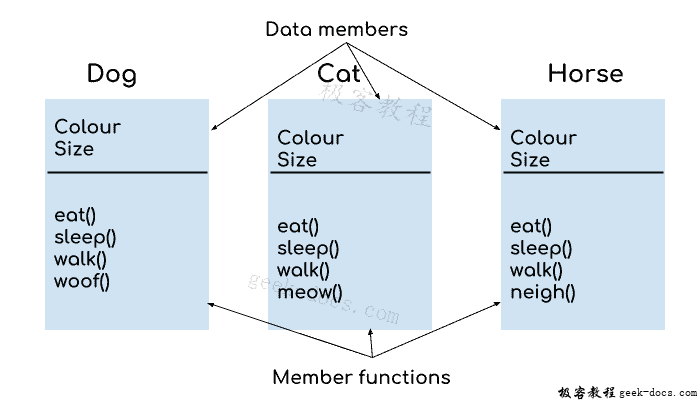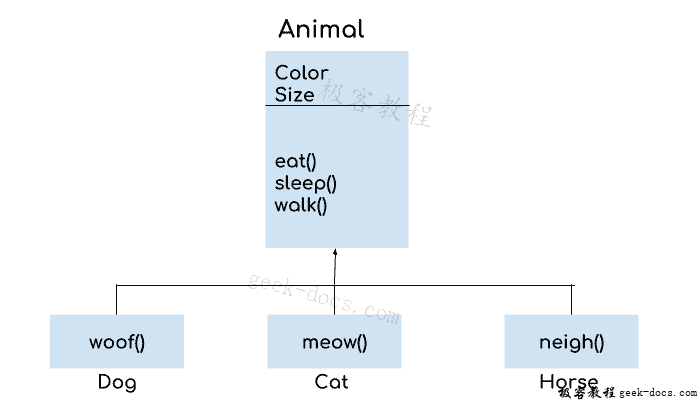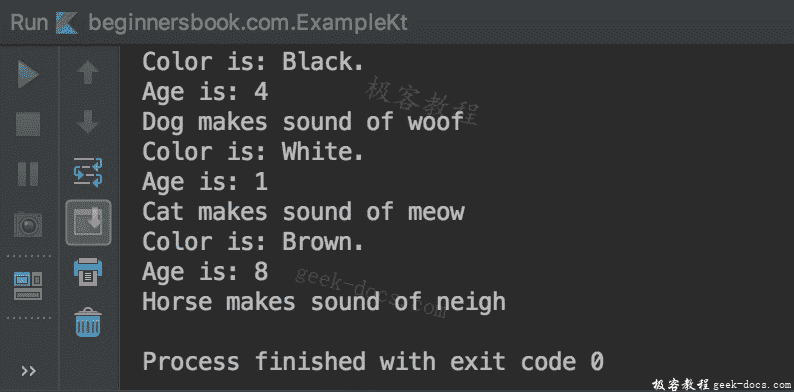Kotlin 继承,继承是一个函数,使用该函数继承另一个类的所有函数。从中继承要素的类称为基类或超类或父类,并且继承要素的类称为派生类或子类或子类。在本指南中,我们将借助示例了解什么是继承以及如何在 Kotlin 中实现它。
什么是继承
假设我们有三个类Dog,Cat和Horse。所有这三个类都有一些属性(数据成员)和一些行为(成员函数)。我们在下图中描述了这些类的属性和行为。

我们可以在图中看到这三个类具有很少的属性和行为,为什么不创建具有公共属性和行为的泛化类,让这三个类继承该泛化类。此外,除了继承的类之外,这些类可以具有其独特的属性和行为。

所以Dog类现在继承了Animal类的所有函数,并添加了一个额外的函数woof(),同样Cat类继承了Animal类的所有函数,并添加了它的独特函数meow()等等。
让我们在 Kotlin 程序中写下这个逻辑。
注意:默认情况下,Kotlin 中的所有类都是最终的,所以你必须在父类中使用open注释,这告诉编译器这个类可以被其他类继承。
open class Animal(colour: String, age: Int) {
init {
println("Color is: colour.")
println("Age is:age")
}
}
class Dog(colour: String, age: Int): Animal(colour, age) {
fun woof() {
println("Dog makes sound of woof")
}
}
class Cat(colour: String, age: Int): Animal(colour, age) {
fun meow() {
println("Cat makes sound of meow")
}
}
class Horse(colour: String, age: Int): Animal(colour, age) {
fun neigh() {
println("Horse makes sound of neigh")
}
}
fun main(args: Array<String>) {
val d = Dog("Black",4)
d.woof()
val c = Cat("White", 1)
c.meow()
val h = Horse("Brown", 8)
h.neigh()
}
输出:

覆盖 Kotlin 中的成员函数和属性
如果子类中存在具有相同名称的函数或属性,则我们需要使用override关键字在子类中覆盖它们。
覆盖成员函数
子类可以使用override关键字覆盖父类的成员函数。通过重写函数,子类为现有的基类代码提供自己的实现。覆盖并不意味着它将更新基类中的代码,该更改仅适用于覆盖函数或其子类的类。让我们举个例子。
open class Animal() {
open fun sound() {
println("Animal makes a sound")
}
}
class Dog: Animal() {
override fun sound() {
println("Dog makes a sound of woof woof")
}
}
fun main(args: Array<String>) {
val d = Dog()
d.sound()
}
输出:
Dog makes a sound of woof woof
覆盖基类的属性(数据成员)
我们可以覆盖基类的属性,类似于我们在上面看到的成员函数。在下面的示例中,我们在父类中有一个属性颜色,我们在子类中重写它。
open class Animal() {
open var colour: String = "White"
}
class Dog: Animal() {
override var colour: String = "Black"
fun sound() {
println("Dog makes a sound of woof woof")
}
}
fun main(args: Array<String>) {
val d = Dog()
d.sound()
println("${d.colour}")
}
输出:
Dog makes a sound of woof woof
Black
从子类调用基类的数据成员和成员函数
在下面的示例中,我们使用super关键字从Child类调用父类的数据成员num和成员函数demo()。
open class Parent() {
open var num: Int = 100
open fun demo(){
println("demo function of parent class")
}
}
class Child: Parent() {
override var num: Int = 101
override fun demo() {
super.demo()
println("demo function of child class")
}
fun demo2(){
println(super.num)
}
}
fun main(args: Array<String>) {
val obj = Child()
obj.demo()
obj.demo2()
}
输出:
demo function of parent class
demo function of child class
100
 极客教程
极客教程